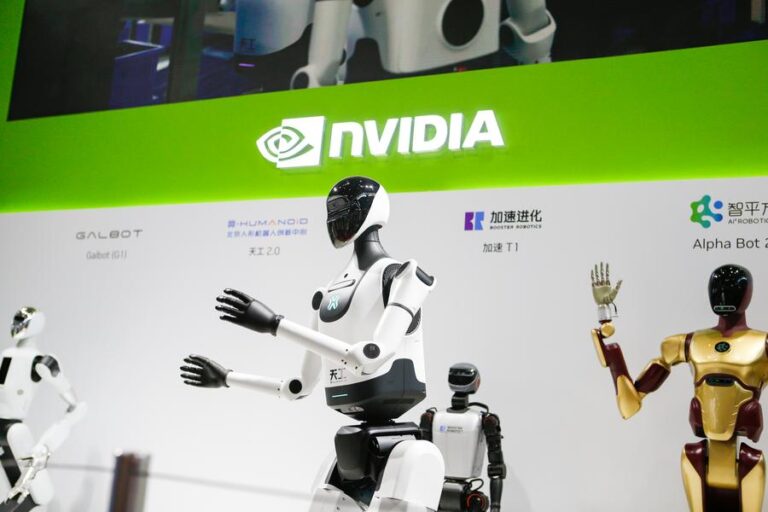BEIJING, July 19 (Xinhua) — To provide a quick overview of what its digital technology can do for China’s many small and medium-sized exporters, a Nanjing-based software firm put up nine striking Q&A posters at an ongoing trade fair in Beijing.
“Where is my product most in-demand overseas?” “How can I ensure my product passes customs compliance?” “Customers want low carbon and what should I do?” “How can I make global supply chain more cost-effective?” — SKYTECH’s AI tools can quickly provide tailored solutions to these questions.
During discussions about fragile global supply chains at the third China International Supply Chain Expo (CISCE), participants noted that China’s AI technology is a source of confidence and a promising avenue for building resilience in global trade.
Qiu Weiwen, a manager from SKYTECH, demonstrated the intelligent system in front of a large screen. “China has the most complete industrial chain in the world, which makes its export product system rather complex, and that’s why we’ve designed an AI system,” he explained.
For new energy vehicle products, it is necessary to input the origins of components like tires, bearings, and battery cells. Even small changes in parameters can result in different solutions from the large model.
“The country where the product is assembled might be different from where its components are produced. We can help you analyze which scenario is more advantageous,” Qiu said.
Another service from the Nanjing firm in east China supports European Union-bound exporters by automating carbon footprint reporting and carbon tariff calculations. Beyond compliance, SKYTECH further delivers strategic guidance enabling clients to capture revenue opportunities through carbon trading schemes.
At a CISCE roundtable on Friday, SKYTECH spotlighted a success story. Under its support, Chinese solar-panel maker Trina Solar built a low-carbon, digitally optimized line that slashes the carbon footprint of its modules well below France’s entry threshold, unlocking instant access to the European market.
In the neighboring booth, tech stars from east China’s Zhejiang Province were unveiling their smart new products, and one of them was NetEase’s AI agent for foreign trade firms.
The NetEase Foreign Trade Express uses “AI employees” to develop overseas customers, with precise inquiries increasing by 30 percent. The AI can automatically identify target customers with an accuracy rate of over 95 percent, saving foreign trade companies up to 1.5 working days per week in customer search time.
Last October, Alibaba International updated its “AI Business Assistant,” enabling real-time optimization of product titles, keywords, images and selling points to drive more online exposure for home-made products for overseas market.
Veteran Chinese mechanics maker Xu Jingqian recalled a puzzling challenge with his screw compressors: strong website traffic in the United States but poor buyer inquiries on Alibaba.
As an early adopter of Alibaba’s AI tool launched in 2023, he received targeted recommendations: Add U.S. specifications, showcase product certifications and clarify door-to-door delivery costs. After implementing these changes, Xu saw his sales more than double.
“AI now auto-translates Chinese small enterprises’ product descriptions into export-ready visuals and listings, making global sales as easy as domestic ones,” said Fan Min, general manager of public affairs at Alibaba 1688, at a CISCE event.
OPEN SOURCE
The introduction of these new products underscores China’s ongoing efforts to sustain the global trade system via digital tools despite increasing uncertainties. Empowered especially by AI technology, the thriving digital trade is emerging as a bright spot in global trade landscape.
At the five-day expo, Nvidia CEO Jensen Huang praised China’s global leadership in AI models, engineering talent and industrial applications. “The supply chain of China is a miracle. It is the largest and most complex in the world, not just about labor, but built on deep technology, AI and software,” said Huang.
In a dialogue event on Thursday, Huang said China is clever about open-source engineering. “Open source has many global implications. It’s not just helping the Chinese ecosystem; it’s helping ecosystems around the world.”
China’s open-source AI models like DeepSeek, Kimi and Qwen are powering supply chains across China and the rest of the world. In February, the NetEase Foreign Trade Express fully integrated with DeepSeek.
China’s digitally deliverable service import and export value in 2024 grew by nearly 40 percent compared to 2020, as shown by figures released by the country’s Ministry of Commerce.
Last year, China’s digital economy core industries contributed about 10 percent of its GDP, while cross-border e-commerce exports grew by 16.9 percent year on year, according to China Council for the Promotion of International Trade, who organized the CISCE.
An initiative launched at the expo calls for the digitalization and intelligent upgrading of supply chains, promoting interconnected data across the entire chain to create better conditions for international trade and investment cooperation. ■

